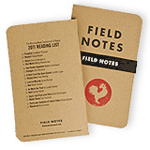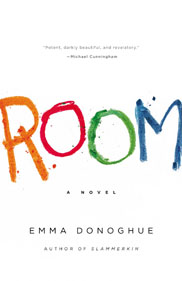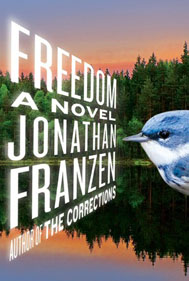-
March 30, 2011
Zombie Round
-
Commentary by
Kevin Guilfoile & John Warner
-
Today’s Winner:
1Freedom
John: In a rematch, it looks like the gravitas gap rears up and claims Room, double-tapping it to a final demise. Judging from some of the comments in the semifinal match between Freedom and Goon Squad, this may not be a popular choice, but it does set up another potential rematch between those two big books in the finals if Goon Squad can get past Lemon Cake.
According to my own gut and backed up by Andrew Seal’s hype statistics, Room is the most broadly popular book in the tournament (among the general public if not our tourney followers), where a combination of positive media attention and reviews and actual reader response has led to strong sales.
And yet, twice it can’t get past Freedom, which has come in for more negative reviews on Amazon this side of Doctor Dawkins’ Face Rejuvenating Cream with Anthrax Extract.
 Buy anything from Field Notes from now until the end of the ToB and receive a special “reading list” memo book free, while they last. Use coupon code ROOSTER.
Buy anything from Field Notes from now until the end of the ToB and receive a special “reading list” memo book free, while they last. Use coupon code ROOSTER.I agree with Judge Filgate that Freedom travels “familiar ground.” It’s true in terms of theme (the title is Freedom, for the love of Pete), as well as milieu. It’s a white male fuckup novel (or maybe a white person fuckup novel) and it makes use of social issues—environmentalism, class status, war profiteering—that you’d expect on the average broadcast of All Things Considered.
I think it’s interesting that, as of yet, Freedom has not managed to pick up any of the major book prizes (the Pulitzer is still pending). Backed up by some information I found in my own butthole, I wonder if the kind of hype Freedom has received, in combination with its white-bread subject matter, has scared off some committees. It isn’t brave or interesting to validate Freedom as the Great American Novel it’s supposed to be. Perhaps when it comes to committee-think, if they can find a worthy challenger, they’ll give it to that book over Freedom, kind of like how occasionally, Michael Jordan would not win the MVP in his prime, despite being obviously the best player year after year.
My own analogy breaks down a little because I don’t believe that, by any measure, Freedom is obviously the best book of the year (though it’s getting close to the Rooster). It’s just that it looks and acts a lot like the kind of book that will be chosen the best of the year.
Outside of all the baggage it has to carry, when it’s just Freedom against another book, it’s faring quite well, which I think is to the book’s credit. I really thought the hype would doom it at some point here, but it continues to march on.
Judge Filgate also zeroes in on an aspect of Freedom that is common to the WMFUN, the crummy marriage (this is the thing the WM is usually fucking up). She comments about Walter and Patty’s union, “if this reflects the reality of most marriages, I dread it already. Reading a book about an unhappy middle-aged couple as a 27-year-old is a bit like standing on the edge of a cliff and succumbing to the irresistible urge to look down at what awaits. Let’s not even go there. Let’s just back away from the cliff and pretend it doesn’t exist.”
Just like we need our characters to fuck up, or they aren’t all that interesting to read about, so too in fiction, marriage tends to get savaged pretty badly. Filgate identifies Patty and Walter as “mismatched,” which may be true, since the genesis of the relationship is Walter waging a kind of war of attrition on Patty’s affections, even as she is more magnetically drawn to Richard. Perhaps this does not bode well for their ultimate happiness, even if Walter is the nicest person in the world.
Still, if you eliminate Richard, that’s a pretty good description of my pursuit of my—at the time future, but now actual—wife. I like to think that we’re doing pretty well, 10-plus years of marriage in with eight years of exclusive monogamy before that. You’ve got a pretty good streak going yourself, Kevin. Maybe you can offer some solace to Ms. Filgate as well.
I’m actually having a hard time thinking of a novel about a successful marriage. The greatest marriage novel ever (IMHO) is actually two novels, Mrs. Bridge and Mr. Bridge by Evan S. Connell. The marriage is, on paper, a perfect match, and they stay together and devoted throughout their lives, but the novels also imply that this devotion is at the expense of their lives as individuals, that the marriage has smothered other possibilities.
This fact is going to be true of all marriages. Being partnered with someone else precludes the exploration of certain individual paths or pleasures. Some avenues will be closed even as others are opened. Despite being happily married, we’ve both written about fractured marriages in our books (predicated on white male fuckups), but none of that time imagining the way someone could blow a good thing soured me on my actual marriage. It reinforced that it’s a pretty easy thing to screw up and it takes at least a little vigilance to keep from doing so.
Kevin: Happy marriages are as rare in fiction as they are in Hollywood, and in both places they are something of a manipulative device. Marriage, especially one with children, is a high-stakes endeavor that anyone can fuck up at any time (unlike, say, the defusing of a nuclear device). And as you point out, it gets screwed up so often in fiction that when a happy marriage happens in a novel, it’s often used only to indicate to the reader that they are supposed to like a particular character. Likewise when a famous actor goes on a late-night talk show and the host mentions that this person has been married for 30 years, it’s only to make the audience go, “Awwwwwww.”
There are a number of interesting, complex but happy marriages in series fiction. C.J. Box does a wonderful job in his Joe Pickett novels of both using a successful marriage as shorthand for the fact that Pickett is a good guy, and also demonstrating that happy marriages are the product of work and compromise and sacrifice. Of course those books aren’t about a happy marriage. We don’t write novels about happy marriages for the same reason there was never a season of 24 in which Jack Bauer lies around in a Snapple-stained robe and plays MarioKart all day.
It is interesting that something that is such a significant part of so many lives goes largely unexamined in fiction. More interesting, I suppose, than actually examining it.
To your point about the popularity of Room, in our (extremely unscientific) Zombie poll TMN readers preferred Room to Freedom by a considerable margin. Goon Squad finished far ahead of Freedom in that survey, as well (with Lemon Cake and Freedom in a virtual tie). Which means that three times in the tourney so far, Freedom has bested a book that TMN readers preferred by quite a lot. We talked about this phenomenon a few years ago with Tom Piazza’s City of Refuge, a fairly unhyped novel (by contrast) that nevertheless made it all the way to the ToB finals. It was a book that seemed to be liked more when compared side-by-side with other books. And I am still recommending it to people.
We’ll find out tomorrow if Freedom is headed for another rematch in an all-New York (Franzen still has a home there, yeah?) finals against A Visit From the Goon Squad, or if Aimee Bender’s The Particular Sadness of Lemon Cake will gun for the Rooster from L.A.
John: It looks like regardless of tomorrow’s outcome, just like last year (and unlike 2009 with City of Refuge), we’re going to have a final between two widely heralded books. I’ll admit to being one of those Rooster fans who would like to see an underdog make it to the finals, but I think whichever book winds up facing down Freedom in the finale can give it a good tussle.
Kevin: Also, I want to give everybody a heads up about the contest we’ll be holding in the comments of Friday’s wrap-up/preview. We’ll be asking our readers to guess which book will win the Rooster, and also what the final tally will be among our 17 judges (e.g. Freedom, 10-7). We’ll have some cool prizes from Field Notes and Powell’s in addition to ToB crowing rights.
I think it’s time to start reading up on the judges.
Kevin Guilfoile is the author of two acclaimed novels, Cast of Shadows and The Thousand, which have been translated into more than 20 languages.
John Warner’s novel, The Funny Man, will be released late September of this year by Soho Press. For the time being, he teaches at Clemson University.

















